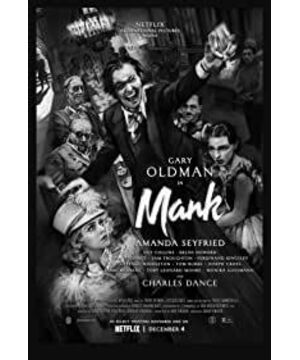After 6 years of absence, David Fincher finally brings his new film "Mank" - a biopic about the screenplay of "Citizen Kane" written by Herman J. Mankiewicz, a screenwriter of the golden age of Hollywood . And before the author found the time to sit down and enjoy it, the viewing guides for "Mank" were already overwhelming the Internet. It seems that since Marvel movies swept the theaters, fan culture such as "N things you must know before watching" and "N hidden easter eggs in movies" gradually took over movie reviews. When watching movies becomes a behavior that needs to be previewed in advance, is the distance between movies and the public also pulled away?
Watching a movie is certainly a learning process. From being scared away by the train on the screen, to being able to feel the end of the world in the cinema with peace of mind, as a product of visual culture under the second industrial revolution, the audience's viewing mentality and the development of film technology go hand in hand. Therefore, for the audience, the content that needs to be learned when watching movies, including but not limited to: the difference between movies as fictional literature and non-fictional documentary news, the difference between movie characters and actors themselves, the values conveyed by movies and the basic social morality difference and so on. In the final analysis, it is the difference between artistic perception of film text and moral informing of real life .
A good movie, putting aside the cultural barriers of language barriers, especially in the new era where the cultural boundaries are gradually eliminated by the Internet, its intrinsic emotional value can achieve a resonance across the boundaries. Young people in Europe can experience Liu Yaren's confusion in the face of the big era in "Burning", and Chinese audiences can also understand the loneliness of Zhonghua Jin in "Joker" that no one understands him. Although regional culture (or subculture) and historical politics serve as very important symbols of interpretation in the film, if all these are not based on a common emotional foundation, the establishment will fail. From this point of view, "Mank" is undoubtedly an unsuccessful film.
The main story line of "Mank" is the process of screenwriter Mank creating the script in the hotel. This main line can be divided into two parts: the process of writing the script and constantly being persuaded to modify the script. In the first half of the flashback line, the film clearly explained the main characters around Manke and the current situation of film practitioners in the golden age. In the flashback in the second half, the director began to focus on depicting the Great Depression in the United States and the election of California governor at that time.
It can be seen that the main motivation that the director understands that prompted Manke to choose to create a satirical Hirst story is the beating of Manke's inner idealism by the external political environment, which finally prompted him to create a story before his talents are exhausted. Proud script. But at the level of story execution, both the power symbol counterpoint of external environmental pressure and the description of the emotional relationship between the protagonist and other characters are very weak.
The external pressure here mainly comes from the political siding pressure of MGM executives and the pressure of filmmakers in the economic crisis. Film art is to make the audience feel abstract emotions by creating concrete images. The creator should have visualized the two vague pressures in the larger environment, established a private emotional relationship with the protagonist, and then cut them off to make the audience feel the same. In the film, the counterpoints of these two stress symbols are MGM executive Joseph and director Shelley. But the problem is that Joseph's character itself is nothing more than the endorsement of MGM bosses Louis B and Hearst, and the two scenes between Joseph and Mank only stay in the debate over the governor's campaign at that time, and do not show Mank. Emotional feedback on this. Likewise, the scene in which the director commits suicide, if it is to be understood as the shooting of Mank's inner idealism, is also very insufficient. First, before the director committed suicide, the audience did not feel the emotional connection between Mank and the director, and the conversation between Mank and another producer after the director's funeral also dispelled the impact of the director's death on Mank. The influence of the creative impulse after Manke, and at the same time dispel the audience's understanding of the change of Manke's values.
The failure to translate this historic political pressure into a shared emotional foundation is a symptom of the play's failure. In contrast to "Edwood", which is also a biopic, Tim Burton, by describing the emotional relationship between Edwood and the aging old actor Bella, directly reflects that in that "old is not as good as new" Hollywood era, a mediocre The director's bottomless persistence and fearless dedication to his dreams. Therefore, the separation of Mank's emotional relationship with other symbolic characters has kept this character from landing, and ultimately, audiences without background knowledge have no empathy for Mank's motivational choices and arc transitions. Is this the ignorance of David Fincher, who has never been a screenwriter (never signed a screenwriter), to the motivations of the characters' plays, or is it just a willfulness and deliberately raising the threshold for watching movies like Nolan's "Creed"? The author does not dare to jump to conclusions. It can only be said that David Fincher has assumed that the audience watching this film needs to have historical background information on American politics and "Citizen Kane".
In addition, from the perspective of artistic creation, Mank's description of the creator's mental journey is also very insufficient. The artistic creation process can be divided into three stages: experience-conception-communication . From the perspective of film viewing, film stories with "creation" as the mother body generally focus on the presentation of "experience" (such as "Nude Lunch") and "conception" (such as "Barton Funk"). Because these two are the cat's eyes through which the audience can peek into the creator's heart.
In "Mank", only half of the hotel's main story is "communication", and all the flashbacks are about "experience". So the bridge from "experience" to "communication" is ignored. Why did Manke choose the idea of writing a satirical Hearst story? This answer is of course not a problem for movie fans and audiences, because they have already held the mentality of "I want to watch the creation process of "Citizen Kane" before watching the movie, so at the beginning of the movie Manke told his secretary about "Citizen Kane" in his mind. When the plot of "Kane", the "prepared" audience had already entered the play. But for non-fan audiences, the motivation for this story choice is missing.
From the perspective of creators and texts, there are actually three creative relationships here: (in real history) Mank’s story creation for Hearst, Jack Finch’s story creation for Mank, and David Finch’s story for Jacket Finn Weird scriptwriting . From a practical perspective, Manke is undoubtedly the most outstanding of the three creators. Because he understands how movies, as fictional story texts, use and balance human emotions, social symbols, storytelling skills, film media attributes, and other factors, so as to create a story inspired by Hearst, but can completely make the Audiences who know Hirst, or even in other countries decades later, can feel the loneliness of the protagonist in Citizen Kane who lacks love for a lifetime. And the real historical and political symbols have been melted into the emotional core of the story like the smoke spit out by Manke. And this is the difference between a feature film and a documentary. The former is the truth of emotion, the latter is the truth of material.
Even if we don't know the history of Mexico, we can feel the tenacity of the protagonist in "Roma" after suffering. A movie full of emotion should not require the audience to collect data before watching it, but should allow the audience to be fully moved by its inner emotional essence without knowing it. Even the moment he walked out of the theater, he had the urge to learn more.
View more about Mank reviews











